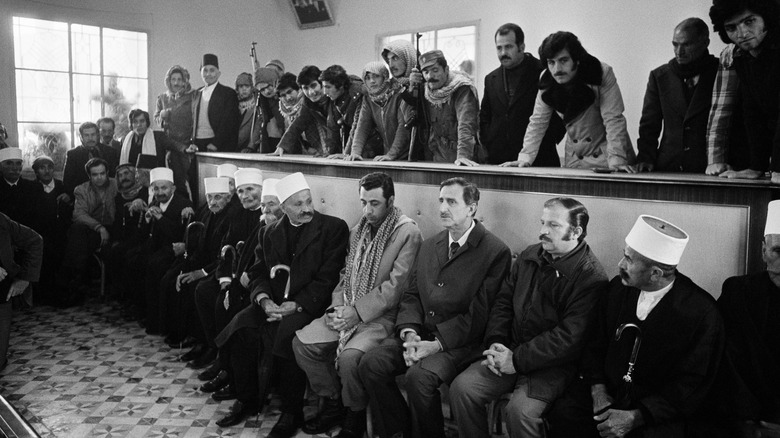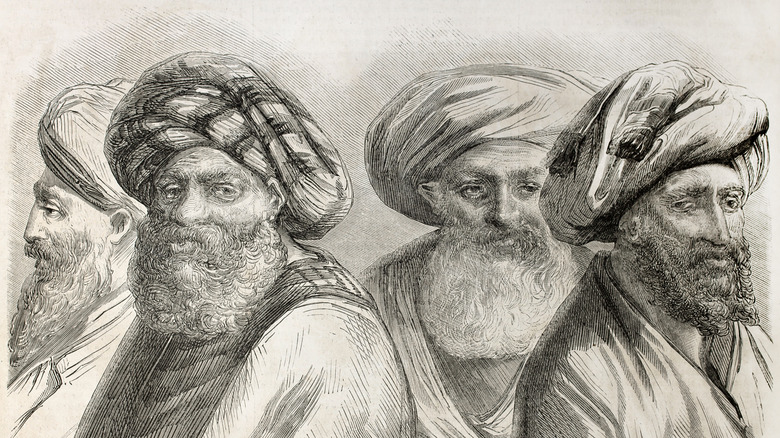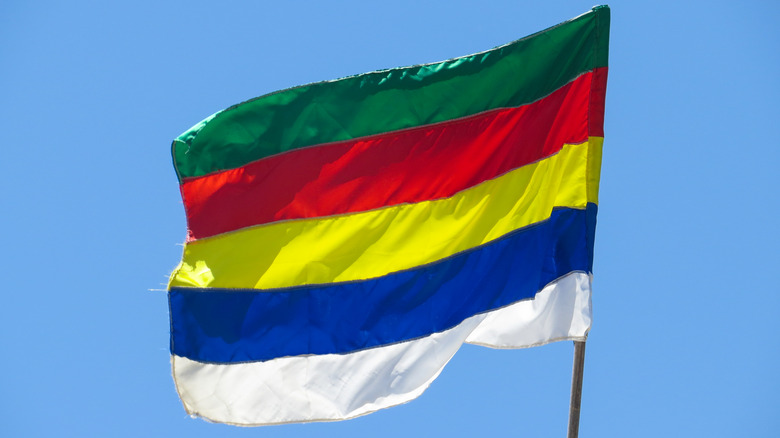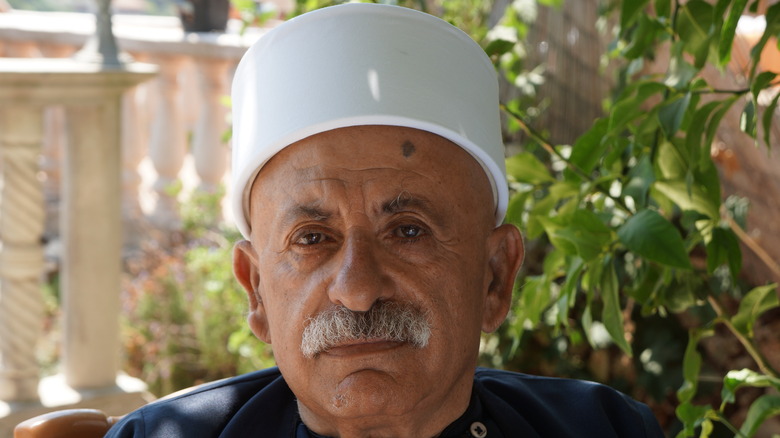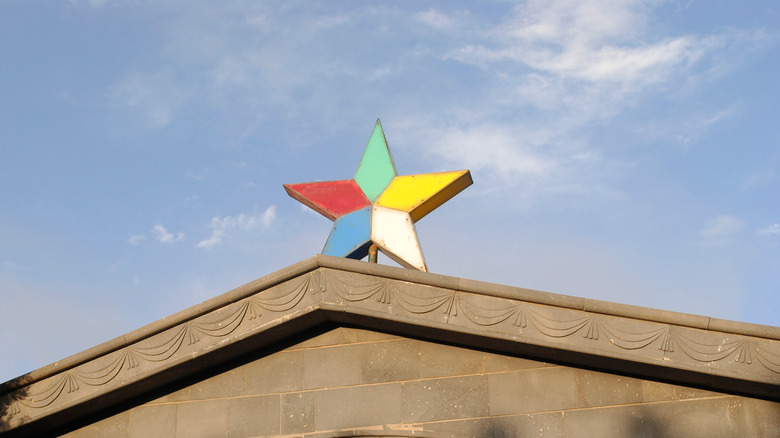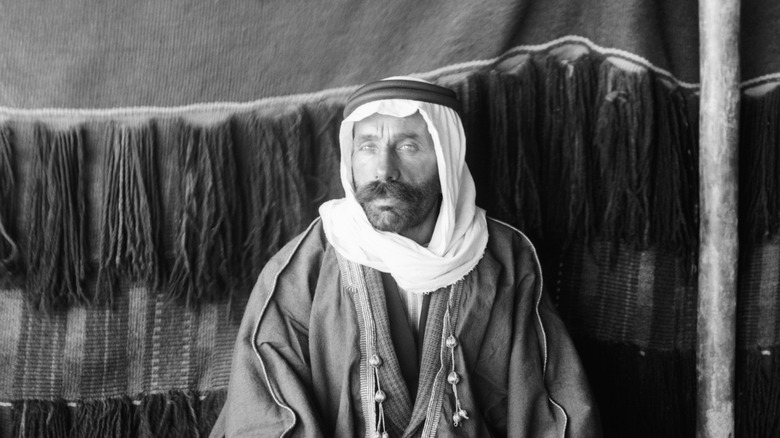What Is Druze And What Do Followers Believe?
The intriguing Druze community is both an ethnic group and a religion. According to estimates published by Arab News, there are just 1.5 million-ish Druze worldwide, most of whom live in the Levant.
In the West, the most famous Druze person living today is probably George Clooney's wife — Lebanese lawyer Amal Alamuddin. In the Middle East, however, this tiny community has a surprisingly large presence, having played a large role in Middle Eastern politics many times over the years. Despite their secretive reputation, quite a lot has been written about this tiny spiritual community, whose enigmatic allure has always sparked fascination in others.
On the other hand, many things about the Druze belief system remain a mystery — even to other Druze. Most people within the Druze community do not have access to Druze spiritual secrets, and only a tiny elite among them have an in-depth knowledge of some of their more esoteric beliefs. This fascinating group draws on ideas from many other religions, and even Greek philosophy, resulting in a broad-minded and mystical conception of God. Intrigued by this tiny faith? You're out of luck — the Druze have closed their doors to converts since 1043.
The divine caliph and the birth of the community
The Druze belief system first arose in Medieval Cairo, back when the city was under the control of the powerful Fatimid dynasty. In the 10th and 11th centuries, the dynasty's sixth caliph, al-Hakim bi-Amr Allah, secured a devout following due to his supposedly divine nature. You will often see it written that he was declared an incarnation of God on earth, however, some scholars say this is a misunderstanding of Druze theology. The Druze believe that al-Hakim was a "tagalli," an "image of god" — a person who acts as a sort of divine teaching tool for mankind (via Arab News).
Establishing who Al-Hakim really was as a human being is a little difficult. Some argue that the source material from this period is laced with unfair slander created by the rival Abbasid caliphate. There are many wild stories about al-Hakim which paint him as a mad eccentric. For example, it is said that the caliph banned vegetables and shellfish he didn't approve of, banned the making of women's shoes to force women to stay indoors, and systematically killed all the dogs in Cairo to stop them from barking. Al-Hakim's unusual religious beliefs eventually caused riots in Cairo, where most people at the time followed the more conventional religion of Ismaili Shi'ite Islam.
Whatever the truth may be, the controversial caliph ultimately did not live very long. The story goes that after taking one of his nightly rides out into the desert he was approached by some Bedouin bandits and completely vanished. His body was never found, only his torn robe — but his followers never gave up on their belief in him and believe he will one day return to earth.
Druze theology
Druze customs and beliefs are in some respects similar to Islam, from whence the religion first arose. Followers abstain from pork and alcohol for example, and they recognize Mohammad, along with Jesus and Moses, as real prophets. However, after that — things start to diverge. Greek philosophers such as Socrates, Aristotle, and Plato are also venerated for their thought and conduct, as are Alexander the Great and Pharaoh Akhenaten. The Druze draw spiritual nourishment from religious figures from all three Abrahamic faiths and from Greek philosophy but reject their rigid use of ritual and tradition.
Like many mystical religions worldwide, the Druze also have a fairly abstract conception of God — believing that God is synonymous with all things, that everything is in a sense divine, and that each of us can know God due to this immediacy. You may recognize the Druze understanding of divinity from other similar belief systems such as Gnosticism or Sufi Islam.
Many Druze also believe in reincarnation which in effect justifies their strict criteria for keeping other people out — if you were meant to be Druze you would have been born one. You cannot marry in or convert.
The mysterious Knowers
Very few Druze people are party to the holiest secrets of the religion. Most Druze are known as the "al-Juhhal" — which means the "ignorant" or unknowing. The International Fellowship of Christians and Jews estimates around 80% of the community falls under this category. The other 20% are awarded special access to Druze secret knowledge and are allowed to read the sacred text, the "Epistles of Wisdom," a collection of 111 letters from the Middle Ages.
Becoming an elite of "knower" or "al-uqqal" ("the wise" in Arabic) is not a life of privilege however — elite Druze must follow strict rules that the unknowing do not have to abide by. For example, they cannot drink or smoke and must attend weekly religious meetings in secret. Due to their surprisingly egalitarian view of humanity, there are more female knowers than men, and it is believed that women are if anything more likely to attain this higher level of spiritual perfection.
Among the al-uqqal, those at the very top of the tree are known as "the generous ones". These senior Druze live an incredibly devout and ascetic existence as part of a pure spiritual life.
Practices and tenets
There are seven core teachings that the Druze adhere to and hold as central to their faith: accepting the oneness of God, speaking truthfully, helping your fellow man, renouncing false beliefs, submitting to God, rejecting the unrighteous, and finding peace in God (via Sami Nasib Makarim's "The Druze Faith"). Faith in God and union with the divine is seen as the ultimate goal of human life.
While faith is very important to the Druze, on the whole, they reject religious rituals as empty practices that can prevent acolytes from really knowing God. For example, there are no sets of prayers, and adherents are not required to undergo pilgrimages or learn a liturgy. In practice, however, the Druze do also partake in a few traditions. Each April, many Druze visit the shrine of the prophet Jethro and those who become initiated as knowers follow some additional customs, such as wearing white turbans and headscarves and attending Thursday night religious meetings.
The surprising role of the Druze in politics
Following the death of the Druze caliph, Al-Hakim bi-Amr Allah, in the 12th century, the Druze continued to follow their belief system despite several violent attempts to reinforce orthodoxy. Perhaps as a natural consequence of this persecution, throughout history, the Druze have had a reputation as formidable warriors and resolute survivors.
Settling primarily in the mountainous regions of the Levant, the Druze became famously difficult to dislodge. They fought fiercely against the European Crusaders during the Middle Ages for example and have been courageous when facing occupation. They became fairly rebellious under the Ottoman Empire, and during the French mandate the Druze Sulṭān al-Aṭrash was instrumental in leading a Syrian revolt against European control.
The surprising strength and tenacity of the Druze have often made them enviable allies in local conflicts. In Israel, the Druze population has retained a brotherly relationship with the Jewish community and took their side during the Arab-Israeli War. Until very recently they even had their own battalion — the Herev, or Sword Battalion — in the Israeli army. Finally, in more recent history, the tiny Druze community was also one of the many factions involved in the 15-year-long Lebanese Civil War, producing a 5,000-man-strong militia of their own (via MERIP).
